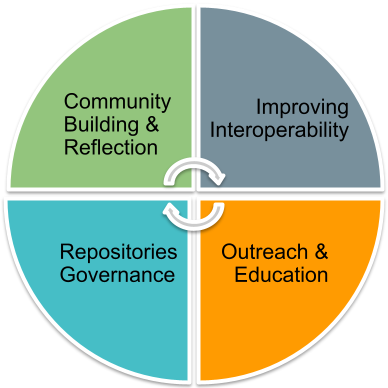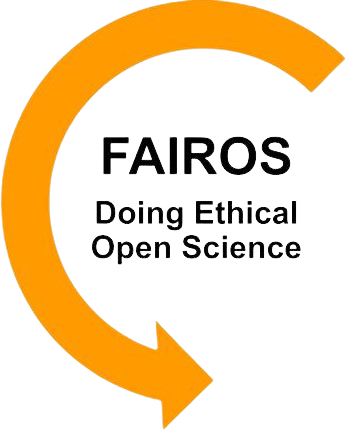Our Work
We aim to improve data infrastructure for the Quaternary scientific community.
Aim 1: Improve Interoperability and Reproducibility
We will develop guidance for interoperability and reproducibility among Quaternary community-curated data resources and promote adoption of broader and more equitable metadata standards.
Aim 2: Advance Data Curation and Stewardship
We will promote better data science and curation practices among disciplinary practitioners, with a particular focus on early-career researchers, and develop and promote best practices and standards for ethical data stewardship.
Aim 3: Support Equity and Improve Access
We will democratize science in a manner that recognizes broader concepts of data ownership and ethical data curation.


Annual Symposia.
We are meeting yearly in person to think together about implementing ethical open science in our data ecosystems, furthering all our aims.
Ethical Open Science Self-Reflection Survey.
Our self-reflection survey on our personal and institutional relationships to FAIR, CARE, and EOS have been guiding our subsequent actions.
Webinar Series.
We provide a forum for experts in informatics and ethics to share their work with us. Click here for more info.
Reading Group.
We meet monthly to discuss selections from the literature on the political economy of data.
Mapping the Interoperability Landscape.
We are interviewing data managers and disciplinary practitioners to map the ways they interoperate data, supporting aims 1 and 3.
Case Study: Linking data across repositories.
Using our focal repositories as a case study, we are developing a workflow to enhance data linkages, furthering all our aims.
Neotoma constituent database landing pages.
These pages offer greater transparency for users of Neotoma's data, a facet of aims 2 and 3.
Case studies: Neotoma, Open Context, Florida Museum.
We are using our focal repositories as case studies for improving data governance and bolstering our commitment to Indigenous data sovereignty.
ECR Projects: Doing Ethical Open Science Across Disparate Data Types.
We are working with early career researchers to develop and use a working methodology that incorporates CARE practices into research that spans time and disciplines.
FAIR/CARE educational materials.
We are producing material for undergraduates studying data science and ecology to introduce them to principles of ethical open data management.
Data repository decision tree.
We are supporting early career researchers by providing them with a resource to guide their choice of repository for data or specimen upload.
RCN Activities
Our project has three overarching aims. In our first years, they have coalesced in these sets of activities. Click any sector of the circle below to learn more about that category.
Mapping the Interoperability Landscape.
We are interviewing data managers and disciplinary practitioners to understand use, needs, vision, and ethics of community-curated data resources, supporting Aims 1 and 3.
Case Study: Linking data across repositories.
Using our focal repositories as case studies, we are developing workflows to surface points where interoperability is inhibited and work toward enhancing data linkages, furthering all our aims.
Neotoma constituent database landing pages.
These pages offer greater transparency for users of Neotoma's data, a facet of aims 2 and 3.
Click here to learn more.
Annual Symposia.
We meet yearly in person to advance project aims, with focused time for group reflection on how to implement ethical open science in our data ecosystems.
Ethical Open Science Self-Reflection Survey.
We developed a self-reflection tool on our personal and institutional relationships to FAIR, CARE, and EOS to guide our subsequent actions.
Webinar Series.
We provide a forum for experts in informatics and ethics to share their work with us. Click here for more info.
Reading Group.
We meet monthly to discuss selections from the literature on the political economy of biodiversity data.
Click here to learn more.
ECR Projects: Doing Ethical Open Science Across Disparate Data Types.
We are working with early career researchers to develop and use a working methodology that integrates ethical open science into scientific practice.
FAIR/CARE educational materials.
We are developing college-level educational materials to introduce students to principles of ethical open data management.
Data repository decision tree.
We are supporting Quaternary science researchers by developing a resource to guide their choice of repository for data upload.
Click here to learn more.
Case studies: Neotoma, Open Context, Florida Museum.
We are using our focal repositories as case studies for improving data governance and bolstering our commitment to ethical open data broadly, including Indigenous data sovereignty.
Click here to learn more.
